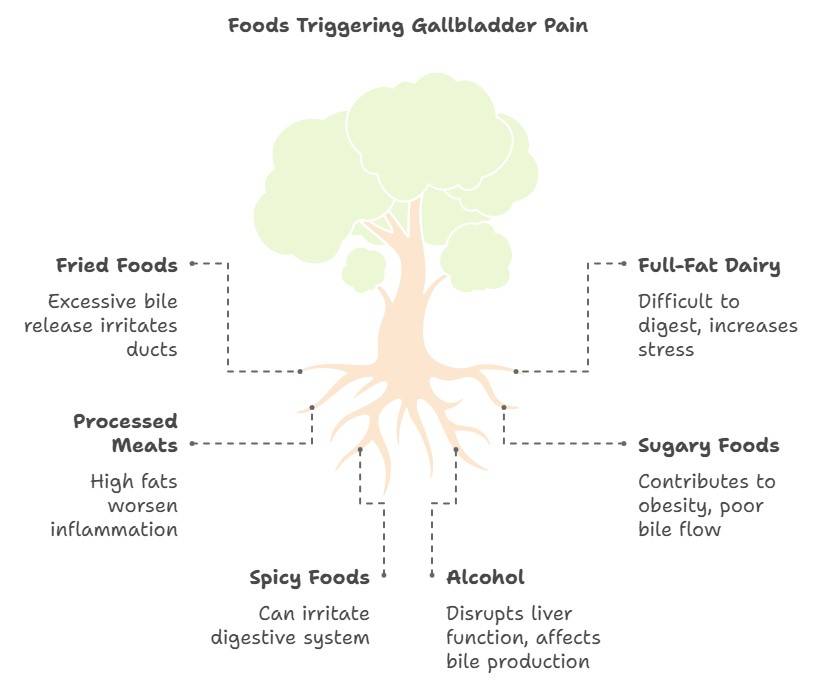Discover 10 natural remedies for gallbladder pain relief that works! Find out how to ease discomfort quickly and improve your well-being. Learn more now!
Gallbladder pain can be debilitating, but the good news is that there are effective ways to manage and relieve it. Whether it’s caused by gallstones, gallbladder inflammation, or bile duct pain, natural remedies can offer relief without invasive procedures. In this comprehensive guide, we’ll explore gallbladder pain alleviation methods, digestive health tips, and strategies for maintaining long-term gallbladder health.
What Causes Gallbladder Pain?
The gallbladder is a tiny organ situated just below the liver. Mix 1–2 tablespoons of apple cider vinegar in a glass of warm water. Stores bile, a digestive fluid essential for breaking down fats. Issues arise when:
- Gallstones form and block the bile ducts.
- The gallbladder becomes inflamed (cholecystitis).
- There are problems with the bile flow.
Symptoms of gallbladder pain include sharp pain in the upper-right abdomen, nausea, vomiting, and discomfort after eating fatty foods. While medical treatment may sometimes be necessary, these natural remedies for gallbladder pain can help.
Foods That Cause Gallbladder Pain

Certain foods can trigger gallbladder pain, especially if you have gallstones or an inflamed gallbladder. These foods often lead to bile overproduction or poor digestion, which can exacerbate discomfort. Here are the key culprits:
- Fried and Greasy Foods
- Deep-fried items like fries, chicken, or onion rings.
- High-fat snacks such as chips and fast food.
Why It Hurts: High fat content forces the gallbladder to release excessive bile, which can irritate or block bile ducts.
- Full-Fat Dairy Products
- Whole milk, butter, cream, cheese, and ice cream.
Why It Hurts: Dairy is high in saturated fats, which can be challenging to digest, increasing gallbladder stress.
- Whole milk, butter, cream, cheese, and ice cream.
- Processed Meats
- Sausages, bacon, hot dogs, and deli meats.
Why It Hurts: These are often high in unhealthy fats and preservatives that worsen inflammation.
- Sausages, bacon, hot dogs, and deli meats.
- Sugary Foods and Beverages
- Desserts, candies, sodas, and baked goods.
Why It Hurts: High sugar levels contribute to obesity and poor bile flow, increasing the risk of gallstones.
- Desserts, candies, sodas, and baked goods.
- Spicy Foods
- Hot sauces, peppers, and heavily spiced dishes.
Why It Hurts: While not harmful to everyone, spicy foods can irritate the digestive system for some individuals, aggravating symptoms.
- Hot sauces, peppers, and heavily spiced dishes.
- Alcohol
- Beer, wine, and spirits.
Why It Hurts: Alcohol can disrupt liver function, indirectly affecting bile production and gallbladder health.
- Beer, wine, and spirits.
- Refined Carbohydrates
- White bread, pasta, and sugary cereals.
Why It Hurts: These can spike insulin levels, contributing to gallstone formation over time.
- White bread, pasta, and sugary cereals.
Pro Tip: If you suspect a particular food triggers your pain, keep a food diary to identify and avoid problematic items.
10 Proven Natural Remedies for Gallbladder Pain Relief
Gallbladder pain relief can often be achieved through natural remedies like warm compresses, staying hydrated, and a balanced diet. Remedies like apple cider vinegar, peppermint tea, and turmeric may also reduce inflammation and support bile flow. However, if pain becomes severe, persists for hours, or is accompanied by fever, jaundice, or other alarming symptoms, immediate medical care is necessary. Recognizing when to seek emergency help, such as with intense pain or changes in stool or urine colour, is crucial for proper treatment.
Natural Remedies for Gallbladder Pain Relief
1. Warm Compress for Pain Relief
Applying a warm compress for pain is a simple yet effective way to relieve gallbladder discomfort. Heat relaxes the muscles and improves blood circulation in the area.
How to Use:
- Place a warm towel or heating pad on the upper-right side of your abdomen.
- Leave it on for 20–30 minutes.
- Repeat as needed throughout the day.
Why It Works: Heat can quickly provide comfort during a gallbladder attack and soothe muscle tension.
2. Stay Hydrated
Proper hydration supports bile production and prevents bile from becoming too concentrated. Drinking enough water also promotes overall digestive wellness.
Tips:
- Drink at least 8 glasses of water daily.
- Add lemon juice to your water for additional benefits. Lemon juice promotes bile flow improvement and may reduce the risk of gallstones.
Why It Works: Staying hydrated is essential for maintaining biliary health and preventing blockages.
3. Adopt a Gallbladder-Friendly Diet
Diet plays a crucial role in managing gallbladder pain. Avoiding fatty and fried foods can prevent further discomfort. Instead, focus on a fiber-rich diet with gallbladder-friendly foods.
Foods to Eat:
- Leafy greens, carrots, and cucumbers.
- Whole grains like oats and brown rice.
- Lean proteins such as chicken, fish, and tofu.
Foods to Avoid:
- Fried and processed foods.
- Full-fat dairy products.
- Sugary snacks and desserts.
Why It Works: A healthy diet for the gallbladder reduces inflammation and prevents gallstone formation.
4. Try Apple Cider Vinegar
Apple cider vinegar for gallbladder pain is a popular natural remedy. Its anti-inflammatory properties can ease discomfort during a gallbladder attack.
How to Use:
- Combine 1–2 tablespoons of apple cider vinegar with a glass of warm water. Brew a cup of peppermint tea and sip it slowly.
- Drink it during a flare-up or before meals to improve digestion.
Why It Works: Apple cider vinegar supports natural pain relief and can help regulate bile production.
5. Use Turmeric for Inflammation
Turmeric, a natural anti-inflammatory spice, has been used in holistic health practices for centuries. Its active ingredient, curcumin, reduces inflammation and supports bile duct health.
How to Use:
- Add turmeric to curries, soups, or teas.
- Take turmeric supplements after consulting a doctor.
Why It Works: Turmeric for gallbladder reduces inflammation and enhances bile flow.
6. Sip on Peppermint Tea
Peppermint has soothing properties that can relieve gallbladder aches and improve digestion. It also helps reduce bile duct pain.
How to Use:
- Prepare a cup of peppermint tea and drink it slowly.
- Drink 1–2 cups daily, especially after meals.
Why It Works: Peppermint tea is a natural digestive aid that supports healthy digestion.
7. Take Magnesium Supplements
Magnesium is essential for muscle relaxation and can help prevent gallstone formation. It’s also effective in improving bile flow.
Sources of Magnesium:
- Nuts, seeds, and leafy greens.
- Magnesium supplements (consult a doctor for dosage).
Why It Works: Magnesium for gallbladder health helps maintain a relaxed biliary system and promotes pain management.
8. Castor Oil Packs
Castor oil has anti-inflammatory properties that can provide relief from gallbladder pain. Using a castor oil pack is a soothing and effective natural remedy for gallbladder issues.
How to Use:
- Immerse the cloth in warm castor oil and apply it to the affected area.
- Add 1–2 cups of Epsom salt to a warm bath and stir until dissolved.
- Cover with plastic wrap and a heating pad.
- Leave it on for 30–60 minutes.
- Repeat 2–3 times a week.
Why It Works: This remedy reduces inflammation and promotes gallbladder detox.
9. Epsom Salt Bath
An Epsom salt bath can relax muscles and reduce inflammation, making it a successful option for soothing gallbladder pain.
How to Use:
- Add 1–2 cups of Epsom salt to a warm bath and stir until dissolved.
- Soak for 20–30 minutes.
- Repeat a few times a week.
Why It Works: Epsom salt supports natural pain management and aids in relaxation.
10. Dandelion Tea for Detox
Dandelion root is known for its detoxifying properties and can help cleanse the liver and gallbladder. It’s an effective option for a gallbladder cleanse.
How to Use:
- Steep 1–2 teaspoons of dried dandelion root in hot water for 10 minutes.
- Strain and drink up to twice daily.
Why It Works: Dandelion tea supports holistic remedies for gallbladder health.
When It’s Time to Seek Emergency Medical Care for a Gallbladder Attack
While mild gallbladder discomfort can often be managed with natural remedies, there are times when medical intervention is necessary. Here’s how to recognize a serious gallbladder attack and when to seek immediate care:
- Severe, Prolonged Pain
- Sharp pain in the upper-right abdomen that lasts longer than 4-6 hours.
- It’s essential to seek personalized guidance from a healthcare professional.
What It Could Mean: A blocked bile duct or severe inflammation (acute cholecystitis).
- Fever and Chills
- Persistent fever is accompanied by shaking chills.
What It Could Mean: An infection in the gallbladder, which can lead to serious complications like sepsis if untreated.
- Persistent fever is accompanied by shaking chills.
- Yellowing of Skin or Eyes (Jaundice)
Noticeable yellowing of the skin or the sclera (the whites of the eyes).
What It Could Mean: A bile duct obstruction caused by gallstones or inflammation.
- Nausea and vomiting
- Repeated vomiting does not provide relief.
What It Could Mean: The gallbladder may be infected or blocked, causing digestive distress.
- Repeated vomiting does not provide relief.
- Changes in Stool or Urine Color
- Clay-coloured stools or dark urine.
What It Could Mean: A bile duct blockage affecting bile flow.
- Clay-coloured stools or dark urine.
- Rapid Heart Rate or Low Blood Pressure
- Signs of shock, including a racing heart or dizziness.
What It Could Mean: A ruptured gallbladder or a severe infection requiring immediate attention.
- Signs of shock, including a racing heart or dizziness.
Preventive Tips for Long-Term Gallbladder Health
- Maintain Healthy Weight
Gradual weight loss reduces the risk of gallstones. Avoid rapid dieting, as it can disrupt bile balance.
- Stay Active
Regular exercise improves digestion and promotes a healthy biliary system.
- Avoid Trigger Foods
Recognize and steer clear of foods that may cause gallbladder discomfort, like fried foods and full-fat dairy products.
FAQs About Gallbladder Pain Relief
How can I alleviate gallbladder pain naturally?
You can relieve gallbladder pain by using a warm compress, staying hydrated, avoiding fatty foods, and trying remedies like turmeric, apple cider vinegar, and peppermint tea.
What are the common symptoms of gallbladder pain?
Symptoms include sharp pain in the upper-right abdomen, nausea, vomiting, and discomfort after eating fatty meals.
Can natural remedies prevent gallbladder issues?
Incorporating plenty of fiber into your diet, drinking enough water, and keeping a healthy weight can help lower the chances of developing gallstones and other gallbladder problems.
When should I see a doctor?
If the pain is intense, persists for several hours, or is accompanied by fever or yellowing of the skin, it is important to get medical help right away.
Final Thoughts
Managing gallbladder pain doesn’t have to be overwhelming. By incorporating these Gallbladder Pain Relief and making lifestyle changes, you can achieve long-term relief and support your overall digestive wellness. Consulting a healthcare professional is crucial for obtaining personalized guidance.

Adel Galal is a health and wellness writer with over 30 years of experience studying and writing about health, fitness, nutrition, and healthy living. He is the founder of NextFitLife.com, where he shares practical, evidence-based guidance to support long-term health at any age. Adel’s mission is simple:
to help people make smarter health choices that fit real life, at any age.



